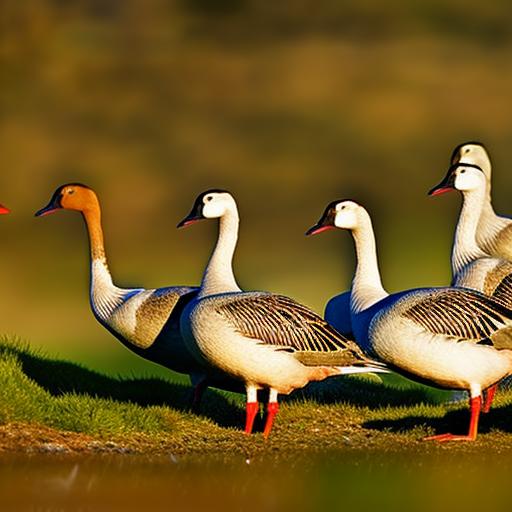Geese have been domesticated for thousands of years and have played an important role in human history. They were first domesticated in ancient Egypt and have since spread to various parts of the world. Raising a flock of geese can be a rewarding experience, as they provide many benefits to their owners.
One of the main benefits of raising a flock of geese is their ability to act as natural pest control. Geese are known for their loud honking, which can deter potential predators and intruders. They are also excellent at keeping grass and weeds in check, as they graze on them throughout the day. Additionally, geese produce nutrient-rich manure that can be used as fertilizer for gardens and crops.
Key Takeaways
- Flock geese are social animals that require a suitable living environment, proper nutrition, and good health and hygiene practices to thrive.
- Providing a spacious and secure living area with access to water and shelter is essential for the well-being of your flock geese.
- A balanced diet that includes grains, greens, and protein sources is necessary to maintain the health of your flock geese.
- Access to clean water is crucial for the hydration and digestion of your flock geese, and should be provided at all times.
- Regular health checks, vaccinations, and hygiene practices can help prevent and treat common illnesses in your flock geese, while protecting them from predators and other threats.
Providing a Suitable Living Environment for Geese
When it comes to providing a suitable living environment for your flock of geese, there are a few key factors to consider. First, you need to choose the right location for your geese. Geese require access to water, so it’s important to have a pond or other water source nearby. They also need plenty of space to roam and graze, so a large open area is ideal.
In terms of shelter, geese require a sturdy and secure structure that can protect them from the elements and predators. A simple shed or coop with enough space for all your geese to comfortably roost is sufficient. Make sure the shelter is well-ventilated and has enough nesting boxes for your geese to lay their eggs.
Ensuring Proper Nutrition for Your Flock Geese
Proper nutrition is essential for the health and well-being of your flock of geese. Geese are herbivores and their diet consists mainly of grass, weeds, and other vegetation. It’s important to provide them with access to fresh greens on a daily basis.
In addition to grazing, geese also require a balanced feed to meet their nutritional needs. There are commercially available feeds specifically formulated for geese that provide the necessary vitamins and minerals. Make sure to choose a feed that is appropriate for the age and breed of your geese.
Understanding the Importance of Water for Geese
Water is crucial for the health and well-being of geese. Geese use water not only for drinking, but also for bathing and preening their feathers. It’s important to provide clean and fresh water for your flock at all times.
Water also plays a vital role in geese’s digestion. Geese have a unique digestive system that requires them to consume water while they eat. This helps them break down their food and aids in the digestion process. Make sure to provide a shallow water source that is easily accessible for your geese.
Maintaining Good Health and Hygiene in Your Flock
Maintaining good health and hygiene in your flock of geese is essential to prevent the spread of diseases and ensure their overall well-being. Regularly cleaning their living area is important to remove any waste or debris that can harbor bacteria or parasites.
Monitoring your geese’s health and behavior is also crucial. Look out for any signs of illness, such as lethargy, loss of appetite, or changes in behavior. If you notice any abnormalities, consult a veterinarian who specializes in poultry to get a proper diagnosis and treatment plan.
Preventing and Treating Common Illnesses in Geese

Geese are susceptible to various illnesses, so it’s important to take preventive measures to keep your flock healthy. One common illness in geese is respiratory infections, which can be caused by poor ventilation or exposure to cold drafts. Make sure to provide adequate ventilation in their shelter and protect them from extreme weather conditions.
Another common illness in geese is parasites, such as worms or mites. Regularly deworming your geese and treating them for external parasites can help prevent infestations. Consult a veterinarian for the appropriate deworming and treatment protocols.
Managing Your Flock’s Reproduction and Breeding
Understanding the breeding cycle of geese is important if you plan to breed your flock. Geese typically start breeding in their second year of life and can lay up to 50 eggs per year. They are monogamous and form strong pair bonds, so it’s important to provide them with a suitable nesting area where they can lay and incubate their eggs.
Caring for goslings and young geese requires special attention. They need a warm and secure environment to grow and develop properly. Make sure to provide them with a brooder box or separate area within the shelter where they can be protected from predators and have access to heat.
Protecting Your Flock from Predators and Other Threats
Geese are vulnerable to various predators, including foxes, raccoons, and birds of prey. It’s important to identify common predators in your area and take appropriate measures to protect your flock. This can include installing fencing, using deterrents such as noise makers or motion-activated lights, or even getting a livestock guardian dog.
Other threats to your flock include diseases, extreme weather conditions, and accidents. Regularly inspect your geese’s living area for any potential hazards and take preventive measures to minimize risks.
Training and Socializing Your Flock Geese
Building a bond with your geese is important for their overall well-being and can make handling and training them easier. Spend time with your geese on a daily basis, talking to them, offering treats, and gently handling them. This will help them become more comfortable around you and other humans.
Teaching your geese basic commands can also be beneficial. Commands such as “come,” “stay,” or “go” can help you manage your flock more effectively and keep them safe. Use positive reinforcement techniques, such as treats or praise, to reward your geese for following commands.
Harvesting and Utilizing Your Flock’s Products
One of the benefits of raising a flock of geese is the ability to harvest and utilize their products. Geese produce eggs, meat, and feathers that can be used in various ways.
Geese eggs are larger than chicken eggs and have a rich flavor. They can be used in baking or cooking, or even pickled for longer shelf life. Geese meat is known for its tenderness and flavor, and can be used in a variety of dishes. The feathers from geese can be used for crafts, such as pillows or quilts.
Raising a flock of geese can be a rewarding experience that provides many benefits. From natural pest control to nutrient-rich manure, geese offer a range of advantages for their owners. By providing a suitable living environment, ensuring proper nutrition and hygiene, and taking preventive measures against illnesses and predators, you can enjoy the many benefits of raising geese. So why not start your own flock today and experience the joys of raising these fascinating birds?
If you’re interested in learning more about how to keep a flock of geese, you might find this article on “How Many Eggs Do Geese Lay?” from Poultry Wizard quite informative. Understanding the egg-laying habits of geese is essential for successful breeding and management. Additionally, if you’re considering turning a shed into a chicken coop, Poultry Wizard has a helpful guide on that topic as well. Check out their article on “Turning a Shed into a Chicken Coop” to learn how to repurpose existing structures for your feathered friends. Lastly, if you’re looking for ideas on creating a garden chicken coop, Poultry Wizard has got you covered with their article on “Garden Chicken Coop.” Discover how to integrate your chickens into your garden space while ensuring their safety and well-being.
FAQs
What are some basic requirements for keeping a flock of geese?
Geese require a spacious and secure outdoor area, access to clean water for drinking and swimming, and a balanced diet of grains and greens.
How many geese should be kept in a flock?
A flock of geese should ideally have at least three to five birds, as they are social animals and thrive in groups.
What are some common health issues that geese may face?
Geese may face health issues such as respiratory infections, parasites, and foot problems. Regular veterinary check-ups and proper hygiene can help prevent these issues.
How can I protect my geese from predators?
Geese can be protected from predators by providing a secure outdoor area with fencing and netting, keeping them in a well-lit area at night, and using guard animals such as dogs or llamas.
What should I feed my flock of geese?
Geese require a balanced diet of grains such as corn and wheat, as well as greens such as lettuce and spinach. They also require access to clean water for drinking and swimming.
How often should I clean my geese’s living area?
Geese’s living area should be cleaned regularly, at least once a week, to prevent the buildup of waste and bacteria. Fresh bedding should also be provided regularly.
Meet Walter, the feathered-friend fanatic of Florida! Nestled in the sunshine state, Walter struts through life with his feathered companions, clucking his way to happiness. With a coop that’s fancier than a five-star hotel, he’s the Don Juan of the chicken world. When he’s not teaching his hens to do the cha-cha, you’ll find him in a heated debate with his prized rooster, Sir Clucks-a-Lot. Walter’s poultry passion is no yolk; he’s the sunny-side-up guy you never knew you needed in your flock of friends!







